High quality nature science underpins all of our efforts to manage our unique biodiversity for future generations sustainably, and an essential aspect of this is offering research grants for university students, funded by donations from our generous supporters.
Since 2000, Nature Foundation has awarded $1,974,786 in research grants to post-graduate students, academics, and the community to kickstart careers in research, supporting 464 students.
This year five student research grants were awarded in the March 2025 round, including a new grant sponsored by benefactor Lyn Ballard, to the value of $5,000.
We are delighted to share this year’s student research grant recipients and their projects with you.
Grant Start Grants – Honours
These grants provide up to $2000 for one year to assist an Honours student undertaking research. Projects may be field-based or involve non-field-based research such as geographic information systems, remote sensing-related projects, or data analysis.
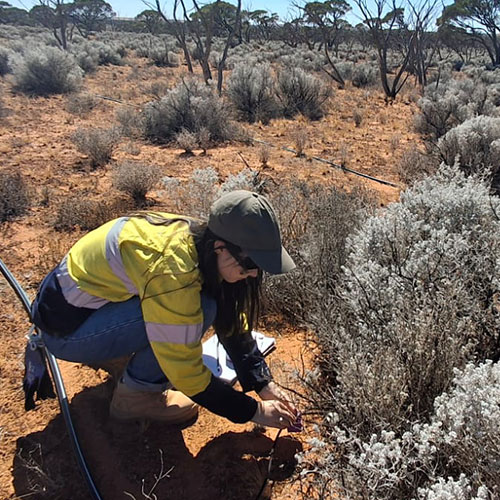 Jaclyn Wilmot
Jaclyn Wilmot
Bachelor of Science (Honours) (Ecology and Evolutionary Biology), University of Adelaide
To Seed or Not to Seed: can nitrogen addition improve the fecundity of Pearl Bluebush (Maireana sedifolia) in the Australian arid lands?
Maireana sedifolia (Pearl Bluebush) is a dominant shrub across many Australian chenopod arid-lands. Its capacity for flowering/fruiting is low and shows remarkable spatio-temporal variation, which poses a significant environmental problem for revegetation projects of previously mined lands. Previous studies have shown that water is not the main factor limiting M. sedifolia fertility and growth, unlike other arid plants. Jaclyn’s project will be conducted within the Yellabinna Regional Reserve surrounding the Jacinth-Ambrosia mine site, approximately 200km northwest of Ceduna. It will investigate whether soil nitrogen deficiency could be the main culprit, and how nitrogen addition via facilitation could be a potential solution for this problem.
Nature Foundation Scientific Expedition Foundation RL & GK Willing Grant
This annual grant provides up to $2000 for one year to support an Honours student. The student’s research must focus on:
- Trends in the abundance and distribution of native populations of South Australian fauna and flora; or
- Soil, water, geology or climate where it will affect abundance and distribution of native populations of South Australian fauna and flora.
This is a partnership between Nature Foundation and Scientific Expedition Foundation.
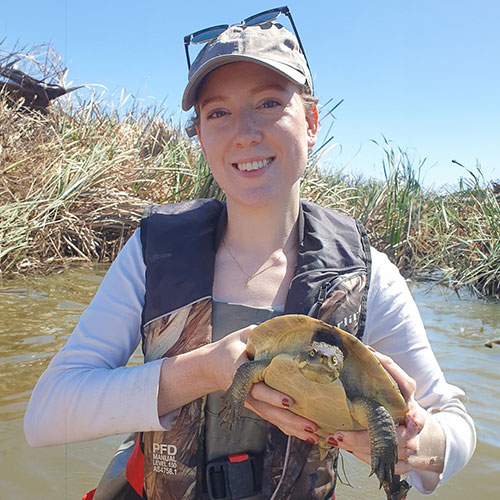 Hannah McKennall
Hannah McKennall
Bachelor of Science (Honours) (Animal Behaviour), Flinders University
Distribution, habitat use and behaviour of Rakali (Hydromys Chrysogaster) across locations of varying human disturbance in the Goolwa and associated tributaries catchment
Hannah's project will investigate the presence of the native Australian water rat, Rakali (Hydromys chrysogaster), its habitat preference, and behaviour in multiple locations of varying human disturbance in the Goolwa region of South Australia. Study locations include Watchalunga Nature Reserve, the Finniss River tributary (mouth), Currency Creek tributary (mouth), and Goolwa township.
Through camera and live trapping, Hannah aims to quantify Rakali's presence and distribution across locations, investigating what environmental variables (including human presence) may significantly affect their habitat preferences. Hannah will also examine differences in scavenging behaviour across locations, which may indicate diet shifts due to urbanisation. Rakali is a significantly understudied species, despite having important roles in freshwater ecosystems and longstanding indigenous significance. Data from this project will contribute to more effective and accurate conservation for Rakali.
Grand Starts Grants – PhD
PhD/Masters Grand Start Scholarships provide grants of up to $3000 per annum for a maximum of three years to assist a PhD/Masters student undertaking research.
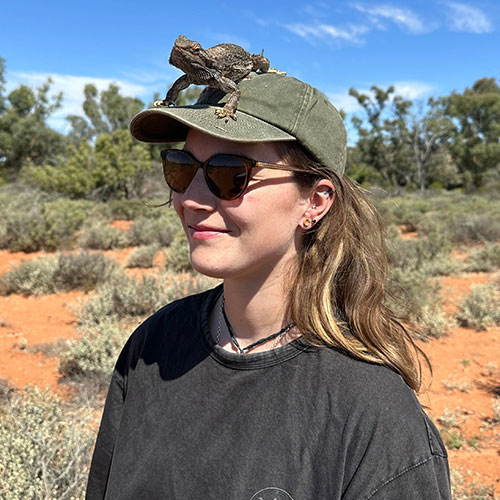 Kathryn Bugler
Kathryn Bugler
PhD, University of Adelaide
Roos on the move: Understanding kangaroo movement for improved conservation
Kathryn’s project involves deploying 60 GPS/accelerometer collars on Red Kangaroos (Osphranter rufus) at Bush Heritage’s BonBon Station Reserve in South Australia to address applied ecological and management questions relating to their movement and behaviour. Using an experimental approach, Kathryn will investigate how agricultural fencing, artificial water points and drought influence Kangaroo movement and behaviour. Findings will refine knowledge and address long-standing human-wildlife conflicts relating to home ranges, travel distances, and use of key resources. Movement data will be incorporated into an individual-based model to test various Kangaroo management strategies. The project’s findings will inform evidence-based Kangaroo management and welfare practices in South Australia and beyond.
Lynette Aplin 'Knowledge in Science' Research Grant
This new grant provides $5000 to a PhD student to support their next year’s research.
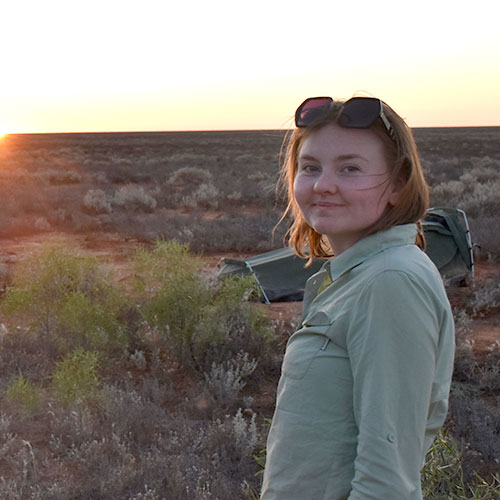 Natarsha McPherson
Natarsha McPherson
PhD in Ecology, University of Adelaide
Spatiotemporal patterns of semi-fossorial mammals in rangeland Australia: A case study of the wombat and rabbit using remote sensing and ecological modelling
A deficiency of spatial distribution data in remote semi-arid and arid rangeland habitats often limits the efficacy of wildlife conservation and pest management. In the Nullarbor Plain and Nullabor bioregion in South and Western Australia, warrens of the Wombat and Rabbit offer fixed proxies that can be detected from satellite imagery, enabling the broad-scale assessment of distribution and ecological interactions.
Natarsha’s project will integrate remote satellite digitisation, field validation, and ecological modelling to establish detailed occurrence data, assess burrowing impact and ecological interactions (abiotic and interspecific), and predict range shifts under environmental change. The project’s outcomes will focus on refining methodological approaches for integrating remote data and models into conservation and pest management planning, improving the long-term monitoring of native species and allowing targeted management of invasive species in semi-arid ecosystems.
Roy and Marjory Edwards Scholarship
This scholarship provides up to $12,000 per annum for up to three years to support a student at an Australian university. This scholarship was initiated in 2002 by a generous donation from Mrs Marjory Edwards to establish a perpetual scholarship in conservation biology.
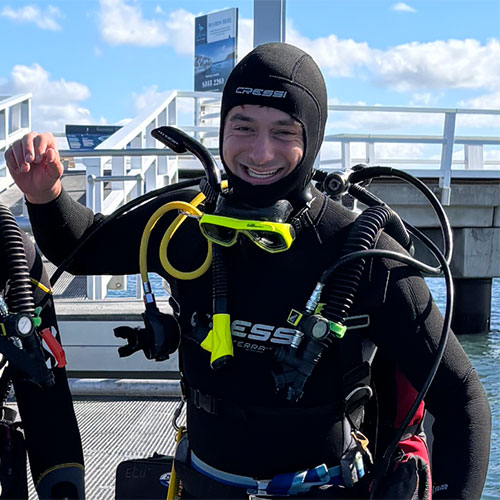 Raphael Clement
Raphael Clement
PhD in Marine Ecology, Edith Cowan University WA
Overcoming barriers to seagrass restoration
Seagrass meadows provide essential ecological and economic services, including marine biodiversity, improving water quality, and stabilising sediments. In southern Australia, the dominant Posidonia seagrass species forms vital habitats for key fisheries, like juvenile King George Whiting (Sillaginodes punctatus). It can store more carbon than any terrestrial forest, but it suffers from serious decline globally.
Raphael’s research investigates a remarkable natural Posidonia recovery in South Australia, likely driven by seed dispersal. The project operates locally, focusing on the metropolitan coastal waters of Adelaide, and at a broader regional scale, encompassing South Australia’s coastline from Port Lincoln to Kingston. Using genetic analysis and hydrodynamic modelling, Raphael aims to understand the ecological drivers of the recovery and connectivity between populations. This project will help develop evidence-based strategies to enhance seagrass restoration in Australia and beyond.
We wish all of our 2025 grant recipients well with their research and look forward to bringing you more updates.
Support our Grants Program
Donating today, you can support our Grand Start Grants program, furthering scientific research for nature conservation. Donations of $2 and over are tax deductible.
If you are interested in speaking with us regarding establishing a scholarship or similar, please contact Philanthropy Coordinator, Patrick Mentzel: [email protected]
Feature photo of a Shingleback Lizard (Tiliqua rugosa) by James Dorey